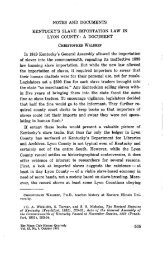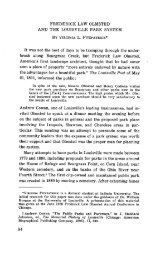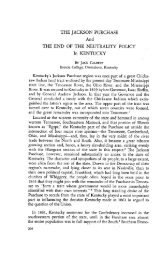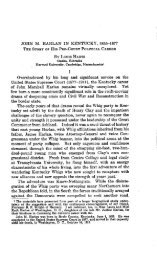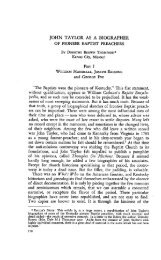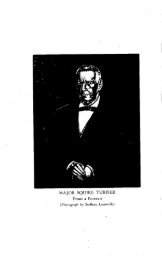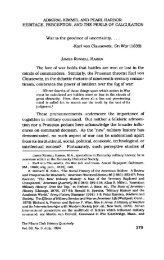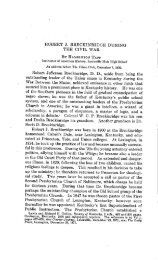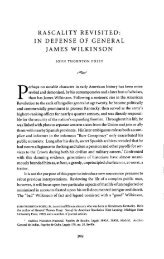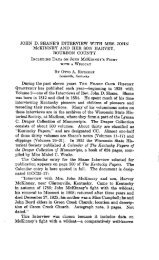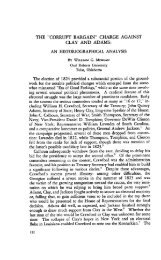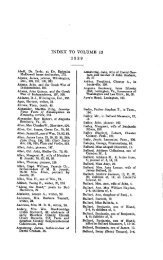Eskippakithiki, The Last Indian Town in Kentucky - The Filson ...
Eskippakithiki, The Last Indian Town in Kentucky - The Filson ...
Eskippakithiki, The Last Indian Town in Kentucky - The Filson ...
You also want an ePaper? Increase the reach of your titles
YUMPU automatically turns print PDFs into web optimized ePapers that Google loves.
Vol. 6 ] <strong>The</strong> <strong>Filson</strong> Club History Quarterly 361<br />
Ramsey <strong>in</strong> his Annals of Tennessee gives us an <strong>in</strong>cident <strong>in</strong> the<br />
northward trek of what must have been the Shawnees Who settled<br />
<strong>in</strong> <strong>Kentucky</strong>, because they are too far west to have been those<br />
who went to Permsylva a. He says: "M. Charlcville, a French<br />
trader from Crozat's colony at New Orleans, came <strong>in</strong> 1714 among<br />
the Shawnees, then <strong>in</strong>habit<strong>in</strong>g the country on the Cumberland<br />
river; and traded with them. His store was built on a mound,<br />
near the present site of Nashville." Here, he says, the Shawnees<br />
had "forted themselves, and ma<strong>in</strong>ta<strong>in</strong>ed a protracted war for the<br />
possession (if their country." However, the Chickasaws and<br />
Cherokees, not lik<strong>in</strong>g such squatters <strong>in</strong> their richest hunt<strong>in</strong>g country,<br />
soon drove them out. Pcnicaut, the French missionary, <strong>in</strong><br />
his Relation for 1714 says, that he "found, among the Natchez,<br />
some slaves belong<strong>in</strong>g to the nation of the Chaouanons who had<br />
been captured by a strong party of Chickasaws, Yazous, and<br />
Natchez, who, under the pretext of visit<strong>in</strong>g their village for the<br />
purpose of danc<strong>in</strong>g the calumet of peace, had attacked them <strong>in</strong> the<br />
most base and treacherous manner, and killed their grand chief,<br />
dth most of his family, took eleven prisoners, among whom was<br />
the wife of the chief, and brought them to Natchez."8 <strong>The</strong>re<br />
seems to have been no game laws protect<strong>in</strong>g the poor, wander<strong>in</strong>g,<br />
home-hunt<strong>in</strong>g Shawnees.<br />
<strong>The</strong> only places open to these flee<strong>in</strong>g Eskippeckians were the<br />
French settlements <strong>in</strong> Ill<strong>in</strong>ois, the deserted <strong>Kentucky</strong> country,<br />
the Creek towns <strong>in</strong> Georgia and Alabama, and the Delaware country<br />
<strong>in</strong> Pennsylvania. Had they gone to Ill<strong>in</strong>ois the French records<br />
would have shown it. To go south to the Creeks would be to go<br />
back <strong>in</strong>to that from which they were flee<strong>in</strong>g. East and west were<br />
closed to them by the vigilant Cherokees and Chickasaws. To go<br />
north of the Ohio and east of the French <strong>in</strong>fluence would put them<br />
<strong>in</strong> the country also claimed by the dread and jealous Iroquois,<br />
their ancient enemies. <strong>The</strong> route to the Delawares led through<br />
hostile Cherokee or Iroquois territory, and therefore for the time<br />
impassible. <strong>The</strong>ir most probable route was down the Cumberland<br />
to the Ohio, thence up it to a settlement <strong>in</strong> central <strong>Kentucky</strong>--to<br />
the land where many of them had been born, but which<br />
had been vacant ever s<strong>in</strong>ce their flight from it thirty or forty<br />
years before.<br />
<strong>The</strong>y must have stopped for a year or so at the mouth of the<br />
Cumberland, to recoup their losses and reorganize, for Moll's map



